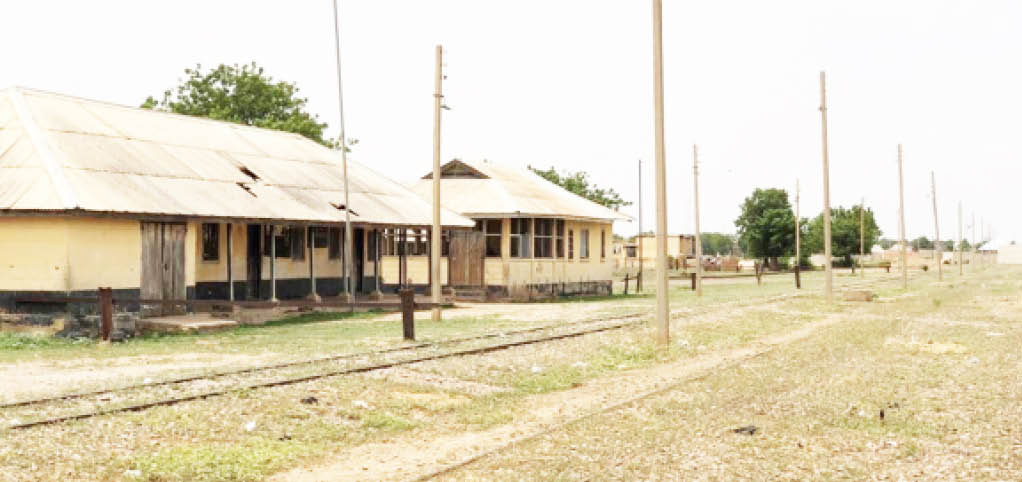Breakdown of Kano-Nguru train cripples businesses, renders thousands unemployed
Gambo Direba was sitting under a tree with thousands of thoughts on his mind because his only source of generating income has not been operating for almost a year now. For over three decades, he has been working at the Nguru train station with his small truck. He picks up goods conveyed by the train […]

Deserted train station in Nguru
Gambo Direba was sitting under a tree with thousands of thoughts on his mind because his only source of generating income has not been operating for almost a year now. For over three decades, he has been working at the Nguru train station with his small truck. He picks up goods conveyed by the train to various stores and shops in Nguru town, and in return he gets money to cater for the needs of his 12-man family.
However, for over 10 months now, the train no longer comes to Nguru. He is left with his truck which he now spends days or even a month without operating. He only works if there is a wedding to convey the bride’s belongings, which is once in a while. This has brought him several financial challenges, as he no longer has the means to take care of his family.
“Our vehicle cannot carry passengers; it carries goods only. When the train was operating, I was always busy. Even though it comes twice a week, the money I get is enough for me to pay the owner, feed my family and even keep some for other purposes. But since the train stopped, I have been battling with providing food for my family. I have two wives and nine children. The owner of the vehicle is about to sell it since there is no job,” he said.
Ogun: Thugs disrupted voting in 99 units, Adebutu tells tribunal
Insecurity: Bauchi rep raises alarm over heightened killings, kidnapping
Gambo Direba is one out of thousands of people affected by the suspended operation of the Kano-Nguru train which served the two big cities with goods transportation between the two locations. Many people, including men and women, who patronized the train are now battling with hike in transportation fare because of the fuel subsidy removal.

During a visit to Nguru by Daily Trust, it was discovered that large businesses are lamenting over the suspension of the train service, while smaller ones are closing as they cannot afford the road transportation. For many years, residents of Nguru have been used to the train service in taking goods that are peculiar to their town into Kano, while they also buy goods, especially food stuffs, from Kano to their city and even beyond.
Among the major goods transported to Kano are farm produce that do not grow much in Kano, such as gingerbread palm (goruba), rice dust (buntu), sesame, hibiscus (zobo), sesame leaf (karkashi), kajiji (used in making fragrance), baobab leaf (kuka) and potash (kanwa). Others are empty jerry-cans, drink bottles, animal skin and animals, including cattle, camels, rams, goats and sheep, among many other things.
The Kano-Nguru old model train was introduced in 1930 during the time of the colonialists. The locomotive travels for 300 kilometres between Kano and Nguru, passing through various towns and villages with hundreds of passengers and goods worth millions of Naira.
With 12 coaches, the train operates four times a week, twice from Kano (Mondays and Thursdays) and twice from Nguru (Tuesdays and Fridays). It was observed that the locomotive aids business activities, not only between the two states but the entire North West and North East. To some extent, it also makes business relations between Nigeria and Niger Republic easier.
Although the train was discovered to have been facing a lot of challenges when it was in operation, it was highly patronised by businessmen and women. Also, women who are into petty businesses take advantage of the train services as it is cheaper and easier for them to move their goods without obstacles.
According to the marketers and passengers, the train accommodated more goods and protected them from challenges associated with road transportation such as armed robbery, extortion from some security officers, as well as its cost effectiveness.
However, for the last 10 months, Daily Trust Saturday gathered that the train has not been operating along the Kano-Nguru axis. Residents of both Nguru and Kano said they are not certain of the reason why the train stopped operating, adding that the authorities told them at some point that there was no diesel for the train to move.
Lamenting their ordeal, one of the leading business operators in Nguru town, Baba Kyalluwa Nguru, said it got to a point where they agreed to add to the transportation fare and also provide diesel for the train, yet nothing was forthcoming.
“They said there is no diesel. That is what they have been telling us for the past 10 months. We are seriously affected by the suspension of this train. It was our cheapest way of taking goods to Nguru, likewise from there to Kano. I have been patronising it for over 21 years now, but I had to switch to using trailers.
“When the train was operating, I used to pay for 3 coaches every week, and each carried the load of over four trailers. We pay N74, 000 per coach, while each trailer will cost us over N200, 000 and it will not carry as much load as the train does,” he said.
Another marketer, Modu Muhammad, who sells food stuffs in Nguru, said the failure of the train to operate has crippled small businesses in the town and the large businesses are facing lots of challenges because some of the trailers develop faults on the way which makes them spend days without coming to Nguru.
He said “When we were using the train, we paid N160 per bag of sugar. But now, we pay N400 for a bag of sugar to come here. We are passing through a lot. We have increased prices of our goods because of this, which is further affecting everybody here.”
Likewise, small businesses also decry the suspension of train services, with some of them already giving up on coming to Kano to sell or buy goods. Travelers also said they are forced to stay at home unless the journey was very necessary.
A businesswoman, Hajiya Adama Muhammad, who buys plastic bowls from Kano, said for the past six months her business has stopped. “We pay only N650 to Kano and pay the same to Nguru in the train. This includes our loads since what we carry is kept close to us in the train. We don’t pay anything for our loads.
“A lot of women like me are into these kinds of businesses. Some take gingerbread palm (goruba), rice dust (buntu), sesame, hibiscus (zobo), sesame leaf (karkashi), kajij (used in making fragrance) to Kano and also bring back plastics to Nguru. But now, majority of us have stopped because we cannot afford road transportation. You will have to pay at least N3,000 for yourself and also pay for your load,” he said.
Similarly, when Daily Trust Saturday visited the Kano train station known as Railway, the place was deserted with few people around, majorly staff. Petty businesses operating around the train station have also shut down. Our reporter sighted a trailer that was used to carry loads for the traders to Nguru, indicating that the trailers had converted the railway station to their own park.
Action deliberate to sabotage our town – Residents
Speaking on the situation, a resident of Nguru familiar with the train service, Malam Madu Abubakar, said they blame the authorities for coming up with a deliberate plan to sabotage the Kano-Nguru train, saying the trains are perfectly working.
“We lack the people to stand for us. This train is serving the masses and making life easier for them. The train is okay now. Nguru has contributed to the development of the country. The train is a signal that Nguru is an old town. Some of the facilities were even sold out by the management,” he said.
He said residents were alleging that the trains have been diverted to some other parts of the country, leaving them waiting over a flimsy reason that there was no diesel. “If you enter the railway now, you will not believe this is a train station. They’ve sold all of the steel. There was a time they sold a whole coach.”
A retired civil servant in the state, who chose not to be named, said there are political issues surrounding the train in Nguru, adding that it is too technical for him to comment on.
He called on the federal government and the railway authority to consider the roles the train is playing and to, therefore, bring back the services.
“The authorities know that Nguru is the terminal point of the rail line in the North. There is a reason why it happened.
“Government should investigate why the train services are not getting to Nguru now because we have a very big army barracks where important things are coming by rail. Without the rail, some items cannot come here,” he said.
Railway authority mum as Nguru LG chair promises train resumption
Efforts to reach the Nigerian Railway Corporation to speak about the matter proved abortive, as the authorities in both Kano and Nguru refused to talk to our reporter.
However, a staff, who spoke on condition of anonymity, said the management is not allowed to speak to the press on any issue concerning the railway.
“The last time we spoke with you, the people were queried for doing that, talkless of now that the train is not working. We all know that it is due to diesel and other issues, but we can’t tell when it will resume. We are also worried as we are just idling away here. The junior staff are passing through a lot. We need the train back,” the staff said.
However, speaking to Daily Trust Saturday, the chairman of Nguru LGA, Alhaji Madu Kachalla, said they have so far visited the railway management three times and that very soon the situation will be resolved.
He said they gathered that the train developed some engine failure, while some rail lines were broken, “But so far, they have repaired the trains and the rail line is also in the process of being fully repaired. Very soon, the train will resume.
“We are even working on ways to make the train a modern one and also expand so that goods can come from Lagos.”
